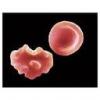Reputation Activity
-
 tricore got a reaction from tesSBB in Patient hx
tricore got a reaction from tesSBB in Patient hx
Ask the patient if they have ever been admitted with another name. We had a woman going for heart surgery and she told the phlebotomist she had antibodies. I asked her where they had been identified. She said this hospital. We could not find any records. When the antibodies were identified she had been admitted with a different name. No computer then. Could not search by MRN. (Note: it does not help when they have been given a new MRN, happens more frequent than I like judging by the number of patients I had to merge when I was in IT.) We had to go to medical records and search the microfiche. She had 3 clinically significant antibodies. Sorry, I don't remember the specificities.
-
 tricore got a reaction from Malcolm Needs in Patient hx
tricore got a reaction from Malcolm Needs in Patient hx
Ask the patient if they have ever been admitted with another name. We had a woman going for heart surgery and she told the phlebotomist she had antibodies. I asked her where they had been identified. She said this hospital. We could not find any records. When the antibodies were identified she had been admitted with a different name. No computer then. Could not search by MRN. (Note: it does not help when they have been given a new MRN, happens more frequent than I like judging by the number of patients I had to merge when I was in IT.) We had to go to medical records and search the microfiche. She had 3 clinically significant antibodies. Sorry, I don't remember the specificities.
-
 tricore got a reaction from SbbPerson in Computer crossmatch validation plan
tricore got a reaction from SbbPerson in Computer crossmatch validation plan
We started using the computer crossmatch in the old Hemocare system in 1997. Back then you had to apply for a variance from FDA. FDA made me jump through hoops before they would grant the variance. They did not publish the guidance until 6 months after we applied. Had to prove the system would not you set up and issue an incompatible product, i.e., issue an A to an O or AB, etc.; that you could not perform an EC on someone with an antibody; that there were two ABO/Rhs on file. We had to send them the evidence that we crossmatched every ABO group against every ABO group to prove the above. The next year I guess they decided that we were not killing people and so you did not have to apply for a variance anymore, but, had to have your validation available. Have to redo the validation with every software upgrade.
-
 tricore got a reaction from Arno in What does Lui stand for? (Freeze-thaw elution)
tricore got a reaction from Arno in What does Lui stand for? (Freeze-thaw elution)
I think Anita Lui was a blood banker in New Orleans. I was there 1977-78 when I first heard of the Lui elution. I believe it was first published in the South Central Association of Blood Banks' Journal.
-
 tricore got a reaction from Malcolm Needs in What does Lui stand for? (Freeze-thaw elution)
tricore got a reaction from Malcolm Needs in What does Lui stand for? (Freeze-thaw elution)
I think Anita Lui was a blood banker in New Orleans. I was there 1977-78 when I first heard of the Lui elution. I believe it was first published in the South Central Association of Blood Banks' Journal.
-
 tricore reacted to Malcolm Needs in Tube Antibody Titers: Yes or No to Enhancement?
tricore reacted to Malcolm Needs in Tube Antibody Titers: Yes or No to Enhancement?
Quite right John. In the UK, we ALWAYS test the previous sample with the latest sample (unless there is a legitimate reason why the previous sample is not available - sample too small, freezer broke down, Malcolm dropped it, etc!). This test is essential in my book, as antigen expression can vary hugely from one donor to another, resulting in either a falsely high titre or a falsely low titre - and either can be dangerous.
-
 tricore reacted to Malcolm Needs in Billing of LUI Freeze elutions
tricore reacted to Malcolm Needs in Billing of LUI Freeze elutions
It isn't. We used it whenever we were looking at a possible ABO HDFN in the Reference Laboratory at NHSBT-Tooting Centre.
-
 tricore reacted to Malcolm Needs in Does this blood bank "critical thinking" question makes sense to anyone?
tricore reacted to Malcolm Needs in Does this blood bank "critical thinking" question makes sense to anyone?
Please don't apologise; I found your question (your question - not the question) quite stimulating. I totally agree with your opinion re the question setter.
-
 tricore reacted to applejw in Donor re-typing
tricore reacted to applejw in Donor re-typing
The requirement to perform a donor retype also plays into whether or not the LIS is used for electronic compatibility testing.
AABB 5.16.2.4 The system contains logic to alert the user to discrepancies between the donor ABO group and Rh type on the unit label and those determined by blood group confirmatory tests and to ABO incompatibility between the recipient and the donor unit. *
*FDA Guidance for Industry: Computer Crossmatch"
-
 tricore reacted to David Saikin in Addition of sterile saline when pooling cryo
tricore reacted to David Saikin in Addition of sterile saline when pooling cryo
We always added some saline when pooling cryo. A moot point nowadays.
-
 tricore reacted to marvy1 in Addition of sterile saline when pooling cryo
tricore reacted to marvy1 in Addition of sterile saline when pooling cryo
Unfortunately in Canada, we cannot get pre-pooled cryo from our supplier. AABB Tech Manual does mention adding saline to aid in the pooling process which is what we do. I haven't done studies, but I would guess a substantial amount of cryo would get left in the bags without the help of saline to "rinse" it out.
-
 tricore reacted to Neil Blumberg in Antibody stimulation by antigen negative blood?
tricore reacted to Neil Blumberg in Antibody stimulation by antigen negative blood?
Probably the primary stimulation was not the fetus, but previous pregnancy, transfusion, tattooing, needle sharing, non-sterile tattooing, etc. Pregnancy is a situation in which B cells are upregulated (type 2 immunity) and T cells down regulated (roughly speaking) and pregnancy may have increased B cell activity to the point where previously undetectable antibodies are now detectable. Just a theory ;).
-
 tricore reacted to Malcolm Needs in What is the meaning of this?
tricore reacted to Malcolm Needs in What is the meaning of this?
What you are identifying is almost certainly a strong anti-H in an Oh individual. However, if the individual requires a transfusion, you will need to perform differential allo-adsorption (or something similar) to identify any other underlying clinically significant atypical antibodies (you can ignore any underlying Lewis antibodies, which are commonly also present).
-
 tricore reacted to Malcolm Needs in Need Help
tricore reacted to Malcolm Needs in Need Help
Anti-Lea CAN be clinically significant, but it is very rare for it to so be, and it tends to be self-limiting. For it to be clinically significant it has to be IgG and/or complement activating, and it is self limiting because, of course, the Lewis antigens are soluble. This means that they will be in any plasma remaining on the red cells in the unit, and these soluble antigens will inhibit the patient's anti-Lea in vivo. You can usually continue to transfuse the same unit that caused the problem after a while, with no further problems. MIND YOU, you have to be ABSOLUTELY CERTAIN that it was anti-Lea that caused the reaction in the first place!
-
 tricore reacted to Malcolm Needs in Need Help
tricore reacted to Malcolm Needs in Need Help
exlimey, I would most certainly agree with your first comment. In the VERY old days, when I was merely middle aged, and we only had access to tube tests and reagents, including AHG, and techniques (such as tile techniques), we didn't kill patients by the thousand, so techniques that are a little less sensitive than are available these days, will not necessarily condemn the patient to a certain and painful death, despite the deafening shouts of those who are gainfully (and, in many cases, VERY gainfully) employed within the neo-science of quality for quality's sake (we needed to pull up our socks in terms of quality, but it has got out of hand).
On the other hand, having seen a fair smattering of Jk(a-b-) patients with anti-Jk3, I am unaware of "sticky" Jk(a-b-) red cells, even when they have been cryopreserved and reconstituted. I am willing to, and will freely admit to being wrong, if I am proved so.
-
 tricore reacted to Malcolm Needs in Why don't we incubate in DAT testing?
tricore reacted to Malcolm Needs in Why don't we incubate in DAT testing?
The DAT is a test to detect either antibodies or complement (or both) on the surface of the red cells that has sensitised the red cells in vivo. Therefore, in a way, the red cells have already been incubated within the body. There is, therefore, no need to incubate ex vivo or in vitro, whichever way you want to put it.
-
 tricore got a reaction from Malcolm Needs in BloodBankTalk: Clinical Aspects of Transfusion Reactions
tricore got a reaction from Malcolm Needs in BloodBankTalk: Clinical Aspects of Transfusion Reactions
I just answered this question.
My Score PASS
-
 tricore reacted to AMcCord in Complement QC with Poly IgG
tricore reacted to AMcCord in Complement QC with Poly IgG
TRM.40200 DAT Controls Phase II
When performing an antiglobulin test with anti-IgG or polyspecific antiglobulin reagents, IgG-coated red blood cells are used as a control in all negative antiglobulin tests. NOTE: IgG-coated red blood cells must be used to confirm all negative antiglobulin test results when the antiglobulin reagent used for testing has anti-IgG reactivity. Tests found negative by tube methodology must be verified by obtaining a positive test result after adding IgGcoated (control) red blood cells. If a licensed blood typing system is used that does not require
verification of negative test results using IgG-coated red blood cells, an appropriate quality control procedure must be followed, as recommended by the manufacturer.
Evidence of Compliance:
✓ Records of testing that include control results confirming negative antiglobulin tests
TRM.40210 DAT Phase II
When performing an antiglobulin test with anti-C3 antiglobulin reagents, C3-coated red
blood cells are used as a control in all negative antiglobulin tests.
NOTE: Complement-coated red blood cells must be used to confirm all negative antiglobulin
test results when the antiglobulin reagent used for testing has anti-C3 reactivity. Tests found
negative by tube methodology must be verified by obtaining a positive test result after adding C3-
coated (control) red blood cells. If a licensed blood typing system is used that does not require
verification of negative test results using C3-coated red blood cells, an appropriate quality control
procedure must be followed, as recommended by the manufacturer. If a polyspecific antiglobulin
reagent is used, refer to checklist item TRM.40200.
Evidence of Compliance:
✓ Records of testing that include control results confirming negative antiglobulin tests
**********************************************************************************************************************************************
I was cited for this years ago. I called CAP and was told that because poly AHG has anti-C3 reactivity as well as anti-IgG reactivity, both had to be confirmed. In addition to this std, she also referred me to the all common checklist which requires that we perform QC on reagents every day of use. So unless the manufacturer of our reagent had some other recommended QC procedure for C3 reactivity, we were required to use the complement coated cells. I put a standing order in for C3 coated cells that day, sent the confirmation email to CAP and my citation was considered corrected on site. I would assume that AABB would view this in a similar way, not to mention CLIA.
When we do a DAT, we are looking for both anti-IgG and anti-C3 activity. If the DAT is positive with poly and anti-IgG, that doesn't preclude anti-C3 activity. If you aren't doing QC for the anti-C3 activity of your poly AHG, how can you demonstrate that your reagent is reacting properly? If you send all DATs out to check for C3 activity, then you would only have to QC the anti-IgG activity and your reference lab would be responsible for the C3 activity.
Having said all that.....have I ever seen a failure with the C3 activity? Nope and I don't expect to. I've given students anti-C3b, -C3d reagent that's outdated by years and it still works just fine. But that's irrelevant and not how the game is played. We don't do very many DATs, but that's also irrelevant. So, I stock the C3 coated cells. Cost of doing business. I find ways to save in other areas.
-
 tricore reacted to galvania in giving RhIG to sensitized mom post delivery do prevent rise in titer
tricore reacted to galvania in giving RhIG to sensitized mom post delivery do prevent rise in titer
Sorry guys but you've got it wrong about the witches. she was a witch if she DID NOT drown - in which case she was burned at the stake. whether she had anti-D or not!
-
 tricore got a reaction from tbostock in Training new employees
tricore got a reaction from tbostock in Training new employees
Document, document, document. I have had several employees who were hired by the evening shift and expected to work in blood bank (generalists) who were totally unsuitable to work in blood bank. Fortunately management listened. It helps to have a very involved Medical Director.
-

-
 tricore got a reaction from BBK710 in Training new employees
tricore got a reaction from BBK710 in Training new employees
Document, document, document. I have had several employees who were hired by the evening shift and expected to work in blood bank (generalists) who were totally unsuitable to work in blood bank. Fortunately management listened. It helps to have a very involved Medical Director.
-
 tricore reacted to Malcolm Needs in Training new employees
tricore reacted to Malcolm Needs in Training new employees
I would agree with mollyredone, but would go further,
Not only do you need to record everything you say to him (and get him to counter-sign the record), you need to record everything you tell your own seniors, and get THEM to counter-sign what you have told them. THIS PERSON IS DANGEROUS. You, as a conscientious employee, should not have to take responsibility for this person, but, if the worst happens (and it well could), you want to make certain that you are not held responsible in law, but that the finger is pointed in the right direction. If you get your own seniors to counter-sign your written concerns, you will, not only be protecting your own future, but will also cause them sleepless nights until they do something about the situation.
-
 tricore reacted to Mabel Adams in Detecting ABO incompatibility with Validated Computer System
tricore reacted to Mabel Adams in Detecting ABO incompatibility with Validated Computer System
As stated above, we use IS XM for ABO compatibility check only when the computer is down. We have passed several TJC and AABB inspections since starting this. Here is a quote from my crossmatch procedure:
Whereas:
Sensitivity: Immediate Spin crossmatch will not detect 100% of ABO incompatible units due to low titer of antibodies or weak expression of the antigens.
Specificity: Immediate Spin crossmatch gives some false positive results (cold agglutinins, rouleaux etc.).
Cold antibodies can cause false positives with immediate spin crossmatches, presenting a quandary on how to manage a unit that is incompatible at IS and compatible at AHG. Warming the sample to avoid the cold antibody might reduce the reactivity of the ABO antibodies as well. This false positive could happen even with an O unit when ABO incompatibility is not even possible.
The BBIS contains algorithms that verify the ABO compatibility of all products selected and our validation shows this to have 100% sensitivity for detecting ABO incompatible units and 100% specificity for avoiding false positive results—both an improvement over immediate spin testing.
-
 tricore reacted to Mabel Adams in ABO incompatibility
tricore reacted to Mabel Adams in ABO incompatibility
Another reason why our computers are better at selecting ABO compatible units than serological testing is.





